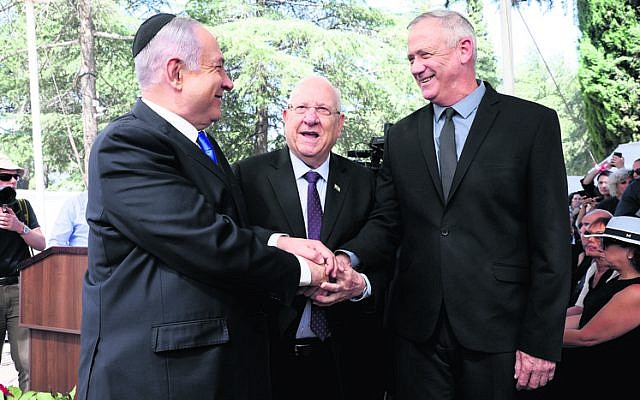‘The opening move of a chess game’
Blue and White beat Likud at polling stations by around 37,000 votes, and in terms of Knesset seats it triumphed by two seats.

LONG after the votes are counted, Israelis remain stumped by a simple question: Who won the election?
President Reuven Rivlin has been frantically trying to reach a conclusion, meeting with every political party and then – exasperated – summoning Benny Gantz and Benjamin Netanyahu together. But he too remains confused.
“The entire country is looking at us with deep concern that we will go to elections for a third time,” he told politicians during his meetings with them – but emerged with nothing concrete to reassure the public that this won’t happen.
The complication is that Gantz’s Blue and White party won on polling day by a razor thin lead, but then in the next stage of the fight, Netanyahu’s Likud won by a razor thin lead.
Blue and White won 33 Knesset seats compared to Likud’s 31. But the decision of who actually builds the government is up to Rivlin, after he surveys Knesset members on their preference. In this popularity contest, conducted on Sunday and Monday, Netanyahu had 55 MKs behind him, compared to 54 who backed Gantz.
Netanyahu’s backing came from his Likud, the hard-right Yamina, which has seven seats, and two Charedi parties. Shas has nine seats and United Torah Judaism has eight.
Gantz received his backing from his own party, the six-seat Labour, the five-seat Democratic Camp, and the 13-seat Joint List of Arab parties. For a time on late Sunday and early Monday, this seemed to put Gantz ahead in terms of recommendations – but then three Joint List politicians withdrew their backing, meaning that Gantz was trailing.
Both of the leading parties are now saying they want a national unity government. “The only government that can be formed under these circumstances is a broad unity government,” said Netanyahu, a big change from his declared aim of establishing a staunchly-rightist coalition.
Moshe Yaalon, a top figure in Blue and White, said, “We need to lead the country responsibly and to establish a unity government that will work for all Israeli citizens.” He called on “all Zionist parties, including Likud” to join – but Blue and White wants Likud to oust Netanyahu before joining.
Rivlin met Netanyahu and Gantz to try to thrash out details of a unity coalition on Monday. He started the meeting by telling them, “The public does not want another election. They came out and voted, and now it is your turn.
“The responsibility for establishing a government falls on you, and the people expect you to find a solution and to prevent further elections, even if it comes at a personal and even ideological cost. This is not the time to exclude people.”
The two party leaders released a joint statement afterwards saying that they “discussed ways to advance Israel’s unity”, and Rivlin reported that the meeting marked a “significant” step. But when The AJN went to press they were far from any agreement. Both parties see themselves leading a unity government, and are understood to be insisting that if they are to take turns at heading the government, that their candidate goes first.
This disagreement is infuriating Avigdor Lieberman, leader of Israel Beytenu. He is the so-called kingmaker, as he could have broken the deadlock by throwing the weight of his party’s eight seats behind one of the top two parties. He refused to recommend anyone for Prime Minister, has spoken derisively about Netanyahu and Gantz’s failure to agree terms for a unity coalition, accusing them of “childish” conduct.
Lieberman said sarcastically that if they cannot decide who should be PM they should just toss a coin. Lieberman has wielded major power in the political process so far, preventing Netanyahu from forming a rightist-and-religious government and pushing hard for a unity coalition that excludes Orthodox parties.
This prospect is terrifying Shas and United Torah Judaism, which consider government positions as essential in looking after the interest of their communities. Both parties had an opportunity to avoid this scenario by recommending Gantz for PM and forming a coalition with him – but a long-running feud with Blue and White’s strongly secularist Yair Lapid meant that they didn’t.
“We will not give up our principles,” said Shas’ leader Arye Deri.
The political situation in Israel is now so confused that it’s unclear whether securing the mandate from Rivlin to form a government makes you the winner or the loser. This is because rumours abound that both Gantz and Netanyahu want to watch the other get the initial chance to build a coalition.
The logic is that the first attempt is destined to fail because all parties will be playing politics. But if he fails and a second candidate is tasked, all parties will feel pressure to cooperate to avoid the process failing and a third election being called.
Jonathan Rynhold, political scientist at Bar-Ilan University, told The AJN that bizarre as it sounds, this could make sense. “There will be more pressure to compromise the second time to avoid an election and whoever fails the first time will be in a weaker position,” he said.
Rynhold predicted that Israelis are in for a long haul – especially as Gantz has an incentive to delay decision-making until Netanyahu faces a pre-indictment hearing for his corruption cases on October 2, which could weaken his standing in the eyes of the public.
“Both leaders want to be seen as pro-national unity,” Rynhold said. “What we are seeing is the opening move of a chess game that will take a while. Gantz will try to make it stretch out until October 2.”

comments